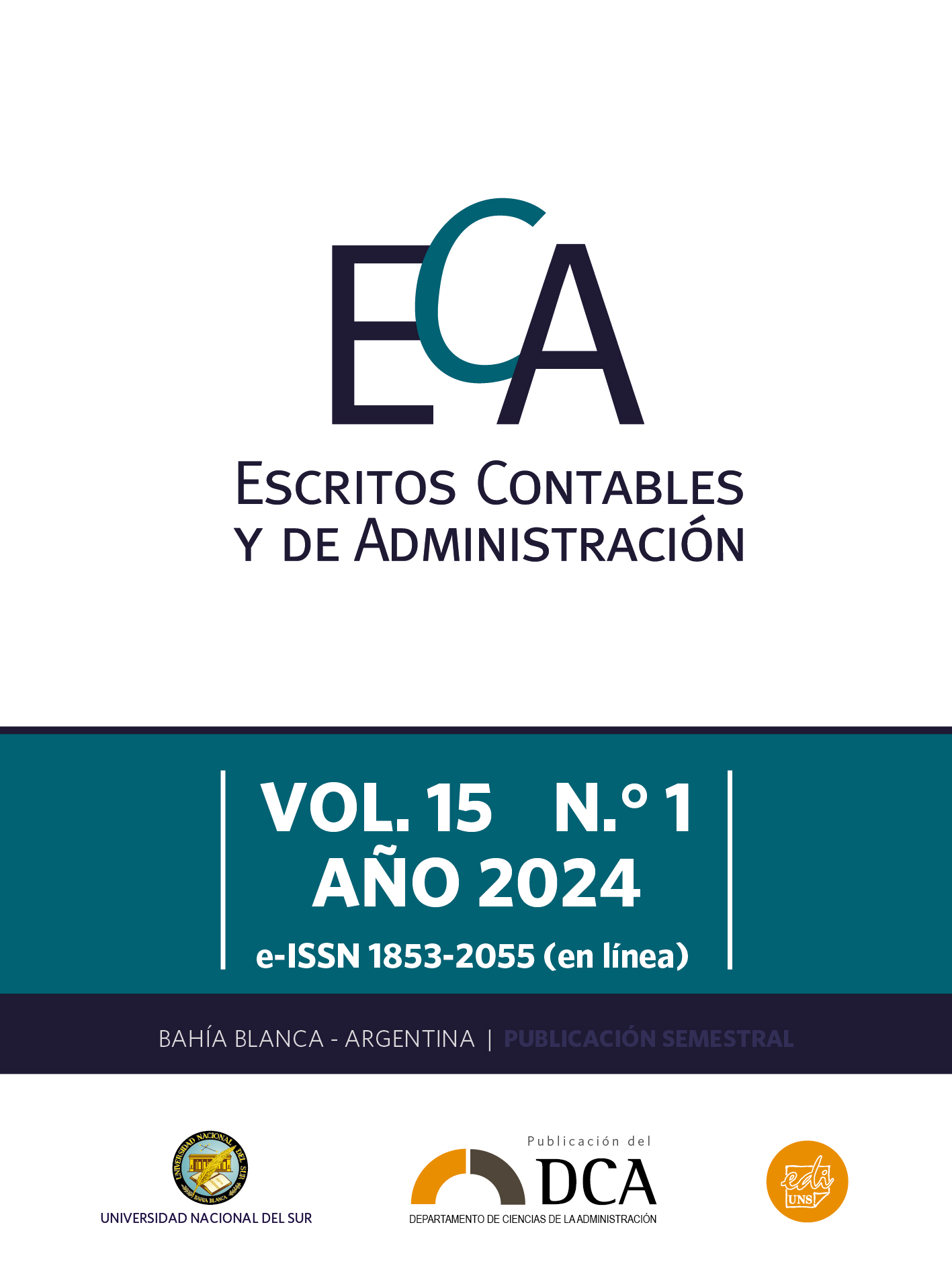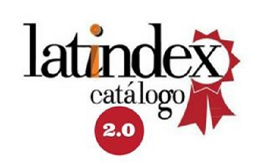Management control and sustainable performance: a conceptual framework under institutional logic
DOI:
https://doi.org/10.52292/j.eca.2024.4265Keywords:
accounting change, management control, sustainable development, institutional theory, institutional logicAbstract
The institutional logic approach has recently been recognised for its potential to interpret the couplings and decouplings between management accounting and performance measurement systems towards sustainability and decision-making. However, there are still gaps in the literature for understanding this process. This article proposes a conceptual framework to describe how management accounting and control can play a catalytic role in incorporating sustainability into management decisions and supporting the implementation of sustainable strategies, under institutional logic. A theoretical essay that considers the complementarity of different approaches and links levels of analysis is developed: supra-organizational, organizational and managerial, through a literature review based on Google Scholar and Scopus searches. The main contribution is a multi-level approach to management control to limit the risk of restricting sustainability to declarative, philanthropic or greenwashing.
Downloads
References
Ahmad, B. y Ercek, M. (2018). Absorptive Capacity and Institutional Theory: A Review and Appraisal of Future Research Agenda. Journal of Economic& Management Perspectives, 12(2), 5-17. https://www.proquest.com/docview/2266933966?pq-origsite=gscholar&fromopenview=true&-sourcetype=Scholarly%20Journals
Alburquerque, A. (2002). Teoría de la Organización y Nuevo Institucionalismo en el Análisis Organizacional. Revista Administración y Organizaciones,8(4), 13-44. https://rayo.xoc.uam.mx/index.php/Rayo/article/view/313
Alford, R. R. y Friedland, R. (1985). Powers of Theory Capitalism, the State and Democracy. CambridgeUniversityPress.
Amat, J. M. (2000). Control de Gestión, una perspectiva de dirección. Gestión 2000.
Anthony, R. y Govindarajan, V. (2008). Sistemas de Control de Gestión. McGrawHill.
Arjaliès, D. L. y Mundy, J. (2013). The use of management control systems to manage CSR strategy: A levers of control perspective. Management Accounting Research, 24(4), 284-300. https://doi.org/10.1016/j.mar.2013.06.003
Arroyo, P. (2012). Management accounting change and sustainability: an institutional approach. Journal of Accounting & Organizational Change, 8(3), 286-309. https://doi.org/10.1108/18325911211258317
Atkinson, A., Kaplan, R., Matsumura, E.M. y Young, S. M. (2012). Management Accounting: Information for Decision Making and Strategy Execution. (6th Edition). Pearson.
Aureli, S., Del Baldo, M., Lombardi, R. y Nappo, F. (2020). Nonfinancial reporting regulation and challenges in sustainability disclosure and corporate governance practices. Business Strategy and the Environment, 29(6), 2392-2403. https://doi.org/10.1002/bse.2509
Bansal, P. y Song, H. (2017). Similar but not the same: Differentiating corporate sustainability from corporate responsibility. Academy of Management Annals, 11(1), 105-149. https://doi.org/10.5465/annals.2015.0095
Barros, K. S. M. de (2011). Réplica 1 - o que é um ensaio?. Revista de Administração Contemporânea,15(2), 333-337. https://doi.org/10.1590/S1415-65552011000200011
Batie, S. S. (2008). Wicked problems and applied economics. American Journal of Agricultural Economics, 90(5), 1176–1191. https://doi.org/10.1111/j.1467-8276.2008.01202.x
Bertero, C. O. (2011). Réplica 2 - o que é um ensaio teórico? Réplica a Francis Kanashiro Meneghetti. Revista de Administração Contemporânea, 15(2), 338-342. https://doi.org/10.1590/S1415-65552011000200012
Bogt, H. J. ter y Scapens, R. (2019). Institutions, situated rationality and agency in management accounting: a research note extending the Burns and Scapens framework. Accounting, Auditing and Accountability Journal, 32(6), 1801-1825. https://doi.org/10.1108/AAAJ-05-2016-2578
Burns, J. y Scapens, R.W. (2000). Conceptualizing management accounting change: An institutional framework. Management Accounting Research, 11(1), 3-25. https://doi.org/10.1006/mare.1999.0119
Carvalho, C. A. y Vieira, M. M. F. (2003). Contribuições da perspectiva institucional para a análise das organizações: possibilidades teóricas, empíricas e de aplicação. En C. A. Carvalho y M. M. F. Vieira (Eds.), Organizações, cultura e desenvolvimento local: a agenda de pesquisa do Observatório da Realidade Organizacional (pp. 23-40). Ed. UFPE.
Chae, B., Paradice, D.B., Courtney, J.F. y Cagle, C.J. (2005). Incorporating an Ethical Perspective into Decision Support Systems Design. Decision Support Systems, 40(2), 197-212. https://doi.org/10.1016/j.dss.2004.02.002
Cloutier, C. y Langley, A. (2013). The Logic of Institutional Logics: Insights from French Pragmatist Sociology.Journal of Management Inquiry, 22(4), 360-380. https://doi.org/10.1177/1056492612469057
Corsi, K. y Arru, B. (2021). Role and implementation of sustainability management control tools: Critical aspects in the Italian context. Accounting, Auditing and Accountability Journal, 34(9), 29–56. https://doi.org/10.1108/AAAJ-02-2019-3887
Costa, M. C. y Marques de Mello, C. (2012). Mudança e lógicas institucionais: panorama e proposta de conciliação entre três diferentes abordagens institucionalistas [Ponencia]. VII Encontro de Estudos Organizacionais ANPAD. Curitiba, Brasil.
Courtney, J. F. (2001). Decision making and knowledge management in inquiring organizations: Toward a new decision-making paradigm for DSS. Decision Support Systems, 31(1), 17–38. https://doi.org/10.1016/S0167-9236(00)00117-2
Courtney, J. F., Brewer, K. L, Graham, J. C. y Parrish, J. L. (4-7 de enero, 2011). DSS & Knowledge Management in Inquiring Organizations: An Update [Ponencia]. 44th Hawaii International Conference on System Sciences.Hawaii, EstadosUnidos. 10.1109/HICSS.2011.172
Courtney, J. F., Richardson, S. y Paradice, D. (2004). Decision support systems for ecosystems managemnt: A Singerian approach to urban infrastructure decision-making. En M. A.Quaddus y A.B. Siddique, Handbook of Sustainable Development Planning: Studies in Modelling and Decision Support (pp. 271-288). E. Elgar. https://doi.org/10.4337/9781845423544.00027
Crossan, M., Lane, H.W. y White, R.E. (1999). An organisational learning framework: from intuition to institution. Academy of Management Review, 24(3), 522-537. https://doi.org/10.5465/amr.1999.2202135
Daft, R. L. y Weick, K. E. (1984). Toward a model of organizations as interpretive systems.Academy of Management Review, 9(2), 284-295. https://doi.org/10.2307/258441
Damayanthi, S. y Gooneratne, T. (2017). Institutional logics perspective in management control research: A review of extant literature and directions for future research. Journal of Accounting & Organizational Change, 13(4), 520-547. https://doi.org/10.1108/JAOC-01-2017-0002
DiMaggio, P. J. (1988). Interest and agency in institutional theory. En L.G. Zucker (Ed.), Institutional Patterns and Organizations: Culture and Environment (pp. 3-21). Ballinger.
DiMaggio, P. J. y Powell, W. W. (1983). The iron cage revisited: Institutional isomorphism and collective rationality in organizational fields. American Sociological Review, 48, 147-160.https://doi.org/10.2307/2095101
DiMaggio, P. J., y Powell, W. W. (1999). Introducción. En W. W. Powell y P. J. DiMaggio(Eds.), El nuevo institucionalismo en el análisis organizacional (pp. 33-75). Fondo de Cultura Económica.
Eden, L. y Wagstaff, M. F. (2021). Evidence-based policymaking and the wicked problem of SDG 5 Gender Equality.Journal of International Business Policy, 4, 28–57. https://doi.org/10.1057/s42214-020-00054-w
Elkington, J. (1994). Towards the sustainable corporation: Win-win-win business strategies for sustainable development. California Management Review, 36(2), 90-100. https://dx.doi.org/10.2307/41165746
Friedland, R. y Alford, R. A. (1991). Bringing society back in: Symbols, practices and institutional contradictions. En W. W. Powell y P. J. DiMaggio (Eds.), The New Institutionalism in Organizational Analysis (pp. 232-263). University of Chicago Press.
Giddens, A. (1984). The Constitution of Society. University of California Press.
Gond, J. P., Grubnic, S., Herzig, C. y Moon, J. (2012). Configuring management control systems: theorizing the integration of strategy and sustainability. Management Accounting Research, 23(3), 205-223. https://doi.org/10.1016/j.mar.2012.06.003
Greenwood, R. y Hinings, C. R. (1996). Understanding Radical Organizational Change: Bringing together the Old and the New Institutionalism. The Academy of Management Review, 21(4), 1022–1054. https://doi.org/10.2307/259163
Greenwood, R., Raynard, M., Kodeih, F., Micelotta, E. R. y Lounsbury, M. (2011). Institutional complexity and organizational responses. Academy of Management Annals, 5(1), 317-371. https://doi.org/10.5465/19416520.2011.590299
Guerreiro, R., Pereira, C. A. y Rezende, A. J. (2006). Em busca do entendimento da formação dos hábitos e das rotinas da contabilidade gerencial: um estudo de caso. RAM. Revista de Administração Mackenzie, 7(2), 78-101. https://doi.org/10.1590/1678-69712006/administracao.v7n2p78-101
Haffar, M. y Searcy, C. (2019). How organizational logics shape trade-off decision-making in sustainability. Long Range Planning, 52(6), 1-26. https://doi.org/10.1016/j.lrp.2019.101912
Hall, D., Guo, Y. y Davis, R. A. (2003). Developing a value-based decision-making model for inquiring organizations [Ponencia]. 36th Annual Hawaii International Conference on System Sciences.Hawaii, Estados Unidos. https://ieeexplore.ieee.org/document/1174255
Hernández-Madrigal, M. (2017). Sistemas de control de gestión y de medición del desempeño: conceptos básicos como marco para la investigación. Ciencia y Sociedad, 42(1), 115-128. https://doi.org/10.22206/cys.2017.v42i1.pp115-
Heugens, P. P., y Lander, M. (2007). Testing the strength of the iron cage: A meta-analysis of neo-institutional theory.(ERS-2007-007-ORG). Erasmus Research Institute of Management (ERIM).
Hinings, B. (2012). Connections between institutional logics and organizational culture. Journal of Management Inquiry, 21(1), 98-101.https://doi.org/10.1177/1056492611419798
Järvenpää, M. y Länsiluoto, A. (2016). Collective identity, institutional logic and environmental management accounting change. Journal of Accounting & Organizational Change, 12(2), 152-176. https://doi.org/10.1108/JAOC-11-2013-0094
Kaplan, R. y Norton, D. (2004). Strategy Maps. Converting intangible assets into tangible outcomes. Harvard Business School Publishing Corporation.
Karyawati, G., Subroto, B., Sutrisno, T. ySaraswati, E. (2020). Explaining the complexity relationship of CSR and financial performance using neo-institutional theory. Journal of Asian Business and Economic Studies, 27(3), 227-244. https://doi.org/10.1108/JABES-10-2019-0106
Kaufman, M. y Covaleski, M. A. (2019). Budget formality and informality as a tool for organizing and governance amidst divergent institutional logics. Accounting, Organizations and Society, 75, 40–58. https://doi.org/10.1016/j.aos.2018.10.003
Kraatz, M. y Block, E. (2017). Institutional pluralism revisited. En R. Greenwood, C. Oliver y T. B. Lawrence, The SAGE Handbook of organizational institutionalism (pp. 532-557). SAGE Publications Ltd. https://dx.doi.org/10.4135/9781446280669.n21
Lada, M., Kozarkiewicz, A. y Haslam, J. (2020). Contending institutional logics, illegitimacy risk and management accounting: A case study analysis of study programme calculations in a Polish public university. Accounting, Auditing & Accountability Journal, 33(4), 795-824. https://doi.org/10.1108/AAAJ-08-2018-3640
Lindberg, K. (2014). Performing multiple logics in practice. Scandinavian Journal of Management, 30(4), 485-497. https://doi.org/10.1016/j.scaman.2013.12.007
Lounsbury, M. A. (2007). Tale of Two Cities: Competing Logics and Practice Variation in the Professionalizing of Mutual Fund. The Academy of Management Journal (AMJ),50(2), 289-307. https://doi.org/10.5465/amj.2007.24634436
Lueg, R. y Radlach, R. (2016). Managing sustainable development with management control systems: A literature review. European Management Journal, 34(2), 158-171. https://doi.org/10.1016/j.emj.2015.11.005
Maas, K., Schaltegger, S. y Crutzen, N. (2016). Integrating corporate sustainability assessment, management accounting, control, and reporting. Journal of Cleaner Production, 136(A), 237-248. https://doi.org/10.1016/j.jclepro.2016.05.008
Malmi, T. y Brown, D. A. (2008). Management control systems as a package. Opportunities, challenges and research directions. Management Accounting Research, 19(4), 287-300.https://doi.org/10.1016/j.mar.2008.09.003
Meneghetti, F. K. (2011). O que é um ensaio-teórico? Revista de Administração Contemporânea, 15(2), 320-332. https://doi.org/10.1590/S1415-65552011000200010
Mercês, R. K. M. das, Silva, R. C. y Araújo, M. A. L. de (2017). Sistema de controle gerencial: uma revisão da literatura sobre sua interação com as estratégias de desenvolvimento sustentável. Revista de Contabilidade da UFBA, 11(3), 75–94. https://doi.org/10.9771/rc-ufba.v11i3.22933
Mitroff, I. y Linstone, H. (1993). The Unbounded Mind: Breaking the Chains of Traditional Business Thinking. Oxford University Press.
Olalla,A. (2017). Modelo de sostenibilidad ambientalen las organizaciones. Estudio de la cadena de valor [Tesis Doctoral, Universidad Politécnica de Madrid. Escuela Técnica Superior de Ingenieros de Montes]. https://oa.upm.es/54715/
Oliver, C. (1991). Strategic Responses to InstitutionalProcesses. TheAcademy of Management Review, 16(1), 145–179. https://doi.org/10.2307/258610
Pache, A. C. y Santos, F. (2010). When worlds collide: the internal dynamics of organizational responses to conflicting institutional demands. The Academy of Management Review, 35(3), 455–476. http://www.jstor.org/stable/25682424
Ponte, D. y Pesci, C. (2022). Institutional logics and organizational change: The role of place and time. Journal of Management Governance, 26, 891–924. https://doi.org/10.1007/s10997-021-09578-6
Risi, D., Vigneau, L., Bohn, S. y Wickert, C. (2023). Institutional theory-based research on corporate social responsibility: Bringing values back in. International Journal of Management Reviews, 25(1), 3-23. https://doi.org/10.1111/ijmr.12299
Rittel, H. W. J. y Webber, M. M. (1973). Dilemmas in a general theory of planning. PolicySciences, 4, 155-169.https://doi.org/10.1007/BF01405730
Roessler, L. (10 de enero, 2018). Leadership, legitimacy and long-term change [Ponencia]. 31st International Congress for School Effectiveness and Improvement. Singapore city, Singapore.https://www.mbz-tirol.at/wp-content/uploads/2019/03/Vortrag_ICSEI_2018.pdf
Scoponi, L. (2016). BalancedScorecard para el Desarrollo Sustentable en empresas agropecuarias. Management Control Review, 1(1), 1-23. http://repositoriodigital.uns.edu.ar/handle/123456789/4170
Scoponi, L. y Casarsa, F. (2017). Institucionalización de prácticas gerenciales de costos e indicadores de desempeño en PyMEs argentinas concesionarias de marcas automotrices. Revista Iberoamericana de Contabilidad de Gestión, 15(29), 1-21. https://repositoriodigital.uns.edu.ar/handle/123456789/6587
Scoponi, L. y Dias, M. F. P. (2015). Contribuciones del Neoinstitucionalismo Sociológico para el abordaje de la Nueva Economía Institucional aplicada a los Agronegocios. Estudos Sociedade e Agricultura, 23(2), 245-267. https://repositoriodigital.uns.edu.ar/handle/123456789/4889
Scott, W. R. (1991). Unpacking institutional arguments. En W.W. Powell y P. J. DiMaggio (Eds.), The new institutionalism in organizational analysis (pp. 164-182). University of Chicago Press.
Scott, W. R. (2001). Institutions and Organizations. Sage.
Scott, W. R. (2012). Embedding the Examination of Multilevel Factors in an Organization Field Context. Journal of the National Cancer Institute Monographs, 44, 32-33. https://doi.org/10.1093/jncimonographs/lgs007
Scott, W. R. (2013). Acercándose a la adultez: la maduración de la Teoría Institucional. (Trad. C. E. Quintero y G. Romo Morales). Revista de Estudios Interdisciplinarios de la Organización, 1(3), 81-101. (Trabajo original publicado en 2008). https://www.researchgate.net/publication/296332939_Quintero_Carlos_E_Y_Gerardo_Romo_Morales_Traduccion_2013_Acercandose_a_la_adultez_La_maduracion_de_la_teoria_institucional_original_de_W_Richard_Scott_en_Estudios_interdisciplinarios
Silva, C. L. M, Guarido Filho, E. R. y Rossoni, L. (2006). Organizational fields and the structuration perspective: analytical possibilities. BAR Brazilian Administration Review, 3(2), 36-52. https://www.scielo.br/j/bar/a/YGknC4wPGdtRhyW5YVJTjxz/?format=pdf&lang=en
Simons, R. (1995). Levers of control: how managers use innovative control systems to drive strategic renewal. Harvard Business School Press.
Simons, R. (2000). Performance measurement and control systems for implementing strategy. Pearson.
Slacik, J., Grüb, B. y Greiling, D. (2021). New wine in old bottles: governing logics for applying sustainability management control systems in Austrian electric utilities. International Journal of Energy Sector Management, 16(1), 50-77. https://doi.org/10.1108/IJESM-06-2020-0016
Suddaby, R. (2010). Challenges for Institutional Theory. Journal of Management Inquiry, 19(1), 14-20. https://doi.org/10.1177/1056492609347564
Thornton, P. H. y Ocasio, W. (1999). Institutional Logics and the Historical Contingency of Power in Organizations: Executive Succession in the Higher Education Publishing Industry, 1958-1990. American Journal of Sociology, 105(3), 801-843. https://doi.org/10.1086/210361
Thornton, P. H. y Ocasio, W. (2008). Institutional Logics. En R. Greenwood, C. Oliver, K. Sahlin y Suddaby, R. (Ed.).The Sage Handbook or Organizational institutionalism(pp. 99-129). Sage. https://www.researchgate.net/publication/235413160_Institutional_Logics
Vo, H., Paradice, D. yCourtney, J. (diciembre, 2001). Problem Formulation in Inquiring Organizations: A Multiple Perspectives Approach [Ponencia]. Americas Conference on Information Systems AMCIS. Boston, Estados Unidos. https://aisel.aisnet.org/amcis2001/384
World Commission on Environment and Development. (1987). Our Common Future.(1st Ed.). Oxford UniversityPress.
Published
How to Cite
Issue
Section
License
Copyright (c) 2024 Liliana Scoponi

This work is licensed under a Creative Commons Attribution-NonCommercial 4.0 International License.
Aviso de derechos de autor
Aquellos autores/as que tengan publicaciones con esta revista, aceptan los términos siguientes:
- Los autores/as conservarán sus derechos de autor y garantizarán a la revista el derecho de primera publicación de su obra, el cual estará simultáneamente sujeto a la licencia Atribución-No Comercial 4.0 Internacional CC BY-NC 4.0.
- Los autores/as podrán adoptar otros acuerdos de licencia no exclusiva de distribución de la versión de la obra publicada (p. ej.: depositarla en un archivo telemático institucional o publicarla en un volumen monográfico) siempre que se indique la publicación inicial en esta revista.
- Se permite y recomienda a los autores/as difundir su obra a través de Internet (por ej.: en páginas web institucionales o personales) una vez publicado su trabajo, lo cual puede producir intercambios interesantes y aumentar las citas de la obra publicada (Véase El efecto del acceso abierto).





















